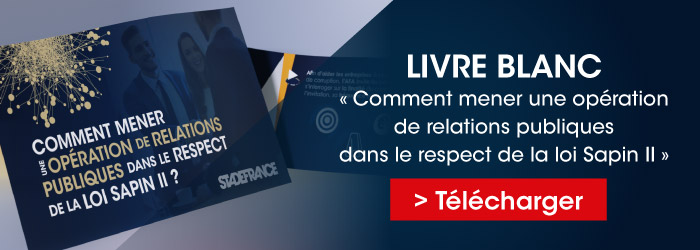
Sapin II law: can one accept a gift or an invitation?
The Sapin II law is named after a former Minister of the Economy and Finance in the government of Manuel Valls who drafted this law in favour of transparency, the fight against corruption and the modernisation of economic life.
With the Sapin II law, the government aimed to bring French legislation up to the best European and international standards in the fight against corruption and to contribute to a positive image of France internationally. This law deals with many subjects such as influence peddling, whistleblowers, lobbyists, public reporting, insurance, strengthening the transparency of the agricultural sector, etc. It has also made it possible to create the Judicial Convention of Public Interest and the French Anti-Corruption Agency (AFA).
In this article, we will explain the details of the law on public relations and the way in which it can have an impact on companies and ordinary business activities.
What is the Sapin II law?
Effective from June 1st, 2017, the “Sapin II” compliance programme is a set of measures aimed at combating corruption in French companies. In this context, it was decided, in particular, to create the French Anti-Corruption Agency (AFA), whose mission is to support economic players to prevent and detect acts of corruption within their organisations, thanks in particular to risk mapping, preventive measures or the implementation of a code of conduct.
Companies that had not yet made specific provisions regarding risks of corruption, therefore began to question their practices, in particular their gift and invitation policies.
To facilitate this approach, in 2020 the AFA published a practical guide specifying the rules governing gifts and invitations in companies. The main idea being to confirm that offering a gift to a customer or inviting a partner to an event is not in itself an attempt at corruption, but an ordinary act of business.
However, the AFA recommends taking certain steps to detect potential attempts at corruption.
Under what conditions can a gift or invitation be accepted?
“By offering, i.e. by providing a good or service without seeking a reward, an organisation can demonstrate its attachment to certain values or traditions. It may also include the offer of gifts and invitations in its sales promotion strategy. Such gifts and invitations are therefore part of the normal course of business”, specifies the AFA.
Before accepting an offer, the AFA invites the beneficiary to consider three points: the purpose of the gift or invitation, its frequency and its value.
“Does accepting the gift or invitation imply action on my part in return?” is the first question to ask.
If applicable, this may conceal an attempt at corruption and it is preferable to refuse the offer. All the more so if it takes place in a risky context, such as during final negotiations before signing a contract or a call for tenders.
If, on the contrary, the gift or invitation is justified by a business reason in connection with the company’s activity, or as part of a company policy, then this quantifies the reasons for which it is offered.
For example, you can definitely accept the invitation to a sporting or cultural event in a VIP box from one of your suppliers or partners who wishes to thank you for the good business relations you maintain together. It is clear that the vast majority of gifts and invitations do not represent acts of corruption when they are offered out of courtesy or in a sales and marketing capacity.

Is it possible to invite business contacts to an event?
Inviting someone does not mean not corruption… According to the AFA report, an act of corruption is an action that “aims to determine the fulfilment or non-fulfilment of an act by a person, in disregard of his or her legal, contractual or professional obligations”.
Inviting a business contact to attend an event does not represent an act of corruption as such. The classification of the offer as an attempt at corruption will depend on the purpose, frequency or value of the invitation, as we have previously mentioned.
In this context, companies that have taken care to develop, in complete transparency, a structured Hospitality programme, meeting specific objectives and monitored over time, may be seen as pioneers. They have clear, measured and documented objectives, as recommended in our guide “Making your Hospitality programme a success”.
By strategically inviting its business contacts, the company clearly shows its intention, moderates the frequency of its offers and respects the meaning of the measure, in order to preserve its ROI. With this approach, it thereby removes any doubt about its intention and therefore the risk of corruption.









